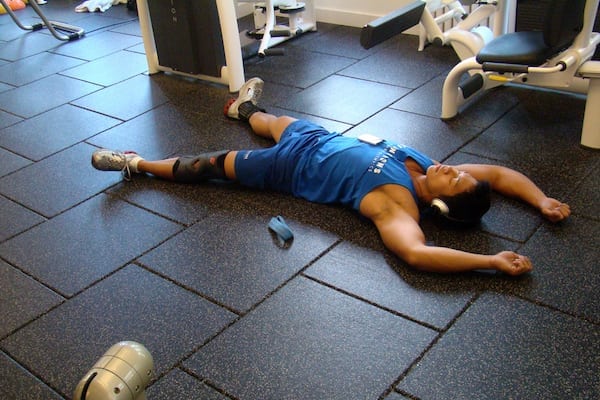No products in the cart.
17 Post Workout Recovery Tips for Muscle and Strength Gains

If you are looking to build muscle and strength then you have probably worked hard tweaking your workout plan.
You have remained dedicated through your workouts for weeks yet are not seeing the gains you would expect. Is there any reason for this lack of progress?
Well, the truth is that while your training methods are important, the muscle can only grow if it is give time to heal. This is where the following post workout recovery tips will help.
Please continue reading to discover how to recover adequately from each workout to see maximum gains.[toc]
Why is Recovery Important?
Recovery after exercise is essential, especially after weight training.
It can take anywhere between 24 and 48 hours to repair and rebuild the damaged muscle fibres torn during training [1].
If you choose to workout too soon after you will experience further tissue breakdown instead of the muscle rebuild and growth.
You should try to avoid working the same muscle groups 2 days in a row. This is why people often split workouts into upper and lower workouts, to give themselves time to recover.
Post Workout Recovery Tips
The following tips should be followed to make sure you recover from each workout:
#1: Don’t Push Yourself TOO Hard

While it is important to push yourself while you workout, it is never a good idea to push yourself so hard that you are feeling those DOMS days after.
If you choose to destroy your body each workout then over time your body will stop trying to build muscle and will spend its time and energy trying to repair the damage.
#2: Look at Your Pre-Workout Nutrition
The foods you eat after your workout is important for repair, but also those foods consumed prior to a workout are important too.
Digestion takes time so those foods and the protein and carbs that they contain will likely be circulating your body while you workout.
You should aim to consume high quality protein and complex carbohydrates before you workout, preferably 2 hours beforehand so that you can avoid any potential digestive issues or cramps.
BCAAs are also a good idea pre-workout too.
#3: Don’t Forget to Stretch
Even if your aim is to gain muscle you still should take a few minutes to stretch prior to your workout.
If your muscles and joints are tight then you may not be flexible enough to complete the full range of motion in certain exercises. For example if your ankles are tight you may struggle to go deep on your squats.
Stretching can also help to relieve muscular tension and can help reduce the muscle soreness you will experience post-workout [2].
#4: Consume a Post-Workout Protein Shake

After every workout aim to consume a protein shake (20-50 grams), men should aim to consume the higher range, while women should be okay with the lower end of this scale.
Your muscles need protein to repair and grow so you need to get enough protein in your diet each day. A shake is a quick and easy way of ensuring you are meeting your daily needs [3].
Rather than choosing a whey protein on cost alone, look for a quality whey isolate to see the best results.
Consuming fast-acting carbs is also a good idea after a workout to help replenish your glycogen levels, restore energy and increase insulin levels. Insulin is important post-workout as it inhibits the breakdown of protein and helps to stimulate protein synthesis.
Chocolate milk maybe a good option post-workout as it contains both protein and fast-acting carbs.
#5: Replace Lost Fluids
When you exercise you sweat, which means that you need to replace those lost fluids.
Water helps to support metabolic function and is essential for helping transfer nutrients around your body [4].
#6: Consume Foods Rich in Potassium
After an intense workout you may find that your potassium levels have been depleted.
Potassium alongside other minerals like sodium and calcium play a key role in muscular energy so it is important that you try to restore the levels post-workout [5].
Bananas are a good choice, as well as mashed potatoes.
#7: Have an Ice Bath
Ice baths and contrast water therapy (alternative hot and cold showers) have been shown to aid recovery post-workout.
This water therapy works by constricting and dilating your blood vessels, which leads to your body flushing out waste products. This helps you to recover faster, will help reduce muscle soreness and prevent injury.
#8: Bath in Epsom Salts
The magnesium sulphate found in Epsom Salts can help flush out toxins, and as it is easily absorbed into your skin can help to reduce inflammation caused during exercise.
A bath in these salts have also been shown to relieve chronic stress, which also will aid in your post-workout recovery.
#9: Get a Good Night Sleep

A good night sleep is important as it is during this time that your body actively repairs itself [6].
Not getting the minimum of 7 hours good quality sleep can also have an impact on your mental state, and leave you with less drive to complete your gym sessions.
To ensure you get a good rest try to avoid using technology just before bedtime, and avoid using devices like your phone in bed. Switch them off and leave them out of your bedroom!
#10: Take Time to Rest
Even the most dedicated athlete knows that you cannot workout 24/7. You need to allow your body time to heal and recover.
Therefore occasionally it will be a good idea to do nothing. Perhaps time to binge on that Netflix show you have been fancying for a while?
#11: Active Recovery
Rest days are important for recovery, but just because you are not in the gym does not mean you don’t have to do anything.
Light exercise like walking, or a short and easy bike ride can actually improve your recovery. As this exercise will stimulate blood flow and improve the circulation to your muscles [7].
Foam rolling might also be a good idea too.
#12: Get a Massage
Not only does a massage feel good and will help relax you. It can also help to improve circulation, which will help to improve recovery [8].
#13: Try to Reduce Stress
Acute stress, which is the type you experience when you exercise is good for you, however chronic stress like you would experience when having to work to strict deadlines or a lack of sleep can negatively affect your recovery [9].
If your stressful lifestyle is coupled with intense exercise you may suffer from poor results, or potential injury.
To help reduce stress there are things that you can do.
I would suggest doing things that you enjoy, or to surround yourself with people you love and who make you laugh. Yoga and deep breathing exercises can also help reduce stress.
#14: Listen to Music

Not only is music good for helping you power your way through a workout it can also benefit your recovery too [10].
While up beat high-temp songs are good for working out, those slow-temp songs can help reduce blood pressure and your pulse rate after your workout.
#15: Cut Back on Alcohol
For those of us who enjoy an occasional tipple you may want to rethink how much alcohol you consume.
Research [11] has found that more than one or two drinks post-workout could reduce your bodies ability to recover.
#16: Look at Anti-Inflammatories
It has been shown that certain anti-inflammatories, including natural spices like turmeric and ginger can help speed up muscle recovery [12].
However, if your aim is to build muscle you may want to avoid NSAIDs like Ibuprofen and Aspirin as they have been shown to hinder hypertrophy or muscle growth.
#17: Take a Testosterone Booster
Testosterone boosters can offer a ranger of health and muscle building benefits, including the ability to reduce recovery times between workouts.
Our number one rated testosterone booster is Testogen. You should read our full review here.
Final Thoughts
You don’t get stronger when you train, it is only through adequate recovery will you see any real progress.
Make sure you follow our tips and you will soon start to see results.
One of the most important things you must do is to listen to your body. If you are feeling tired or notice a decrease in your performance levels then it maybe a good idea to increase recovery times, or perhaps take a break from training entirely.
If you listen to your body you will know what it wants and needs. Failure to listen will result in no progress being made, frustration and possible overtraining. Something I am sure you do not want to happen.
